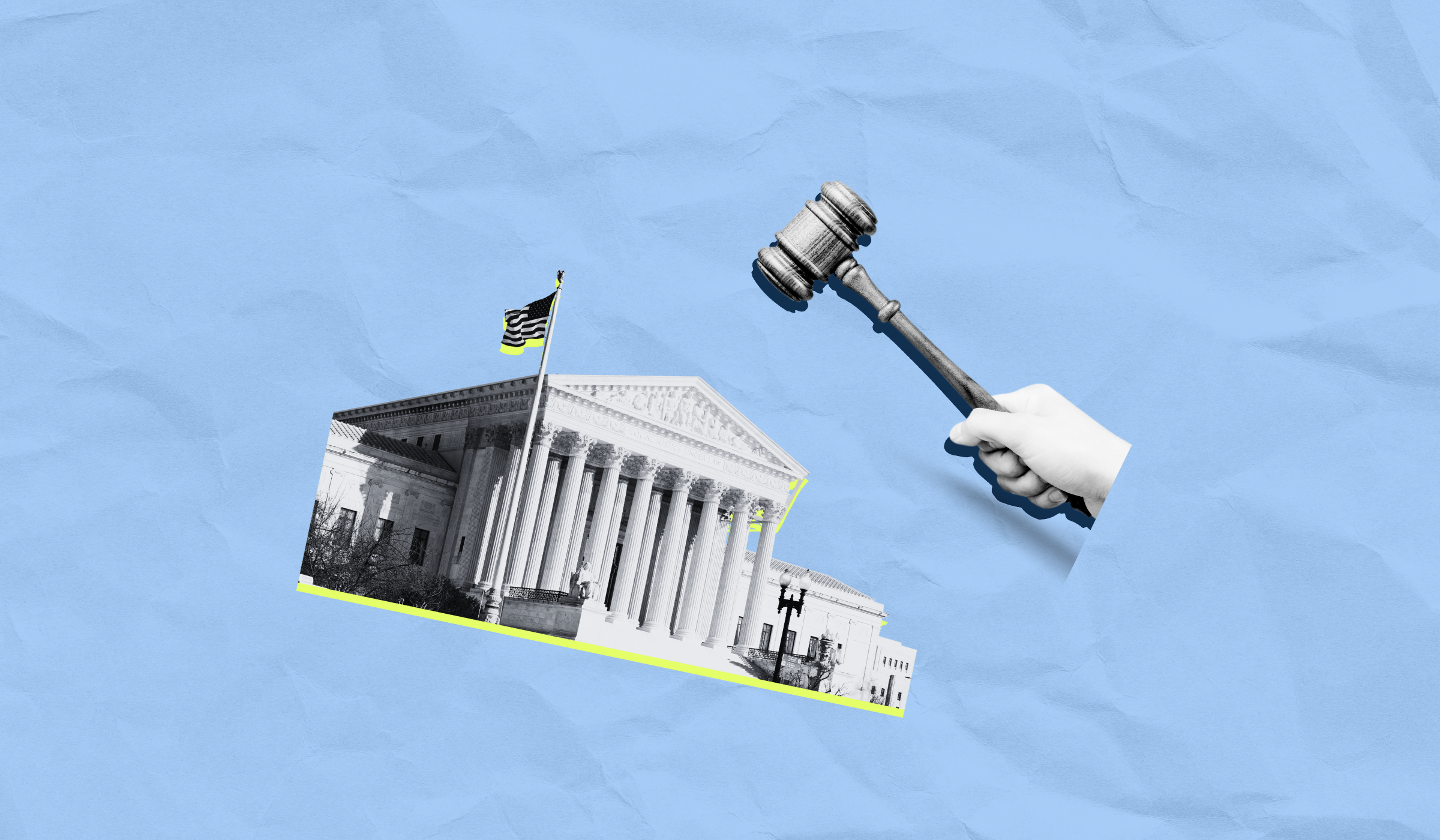—"Oyez! Oyez! Oyez!* All persons having business before the Honorable, the Supreme Court of the United States, are admonished to draw near and give their attention, for the Court is now sitting."
*"Oyez" is an Old French word meaning "hear ye," used in medieval times to announce the start of a court proceeding. Basically, "be quiet and pay attention." This chant also marks the start of every Supreme Court session.
On Monday, October 6, the Supreme Court's 2025-2026 term began—and from the docket, it's already clear this is going to be an important year for civil rights and civil liberties. Over the next several months, the Court is scheduled to hear cases with huge implications for free speech, LGBTQ rights, policing, and more.
But if you find the Supreme Court confusing, you're not alone. Cases keep getting added to the docket, substance is lost in the legalese, oral arguments are weirdly formal and performative—and many people end up caught off guard in June when blockbuster decisions drop.
So to help out all you current or aspiring court watchers, the ACLU of Vermont is launching a new blog called The Gavel: Understanding the U.S. Supreme Court's Heavy-Hitting Cases. Through this series, we'll be demystifying Supreme Court procedures, introducing you to some of the most important civil rights and civil liberties cases, summarizing oral arguments, and breaking down the big decisions, including their impact on Vermonters—all in language that is (hopefully) a bit easier to understand.
Now, let's get started with a review of an important trans rights case:
Chiles v. Salazar | LGBTQ rights, free speech
Question presented:
Does a Colorado law banning “conversion therapy”—i.e., attempts to “convert” someone’s sexual orientation or gender identity—violate the Free Speech Clause of the First Amendment?
Facts & Argument:
In 2019, looking at a mountain of evidence showing its harmful effects, Colorado passed a law banning conversion therapy on minors. Trying to change a child's sexual orientation or gender identity, Colorado explained, is "unsafe and ineffective." A healthcare provider who breaks that law may be disciplined and could lose their license.
Kaley Chiles is a Christian therapist who sued the state in 2022, arguing that this ban violates her free speech rights because it limits what she's allowed to discuss with her patients. Chiles says this prevents her from speaking on her values and is viewpoint-based discrimination (i.e., government favoritism of one perspective on a topic over another) because the ban allows a therapist to support a child's transition but not discourage it. She claims that the law is split across the country, so this is a good opportunity for the Supreme Court to weigh in.
Colorado disagrees. Colorado insists that the First Amendment allows a state to regulate healthcare providers’ conduct and make sure they aren't providing substandard care, even when that regulation also happens to limit some speech. The state also reasons that different free speech restrictions are allowed when we're talking about healthcare providers and their patients compared with friends having a chat. And Colorado says that courts across the country haven't actually reached different conclusions, so there's no need for the Supreme Court to get involved. Besides, Colorado argues, there hasn't been any disciplinary action against Chiles, and she's never even claimed she wanted to practice conversion therapy in the first place—so this is all hypothetical anyway, and this case shouldn’t be before the Court.
Oral Argument Recap:
On October 7, for nearly 90 minutes, the justices grilled Chiles’s attorney, an attorney representing the United States and supporting Chiles, and an attorney for Colorado. The Court spent a lot of time grappling over whether counseling is more like speech, protected by the First Amendment, versus medical treatment, which states historically are able to regulate. This kind of therapy is speech, Chiles and the United States argued, so we are squarely in “First Amendment land” where protections are the strongest. Absolutely not, asserted Colorado—this therapy is treatment, and when you go to a licensed healthcare provider, you expect them to be following accepted standards of care, not just riffing on their beliefs.
And, because, under the First Amendment, different kinds of speech are treated differently, the justices also pushed the parties on what level of “scrutiny” should apply—essentially, how much deference should Colorado get to address a problem. Just how much evidence, Justice Thomas wondered, does Colorado have to show to win? Chiles claimed that the science around conversion therapy is debated; Colorado insisted that there’s ample evidence that conversation therapy is harmful; and Justice Sotomayor tried to cut through the noise and clarified that the state doesn’t always need to provide a study anyway, even when applying strict scrutiny (the least deferential kind of judicial review, where the state has to prove its law is narrowly tailored to serve a compelling government interest).
There was also some back and forth that Chiles hasn’t properly shown that this law would harm her and that maybe the Court should “remand” (or send the case back down) to the appellate court to apply strict scrutiny—but no one seemed very excited about that.
Consequences:
Regardless of how the Court rules, states still can't require someone to undergo conversion therapy. However, it could make it harder for states to ban conversion therapy. Based on the justices’ questions, it seems that the Court may try to further draw the line between speech versus medical conduct—but they could just as easily kick the can on that issue.
In Vermont, a 2016 law (18 V.S.A. § 8352) makes it illegal for mental health care providers to perform conversion therapy on minors. If the Court sides for Chiles, Vermont lawmakers will need to take a close look at their law to make sure that it survives whatever test the Court uses to make its decision.
In our next issue of The Gavel, we’ll be pivoting to the criminal legal system and exploring two cases involving policing and voting rights.

